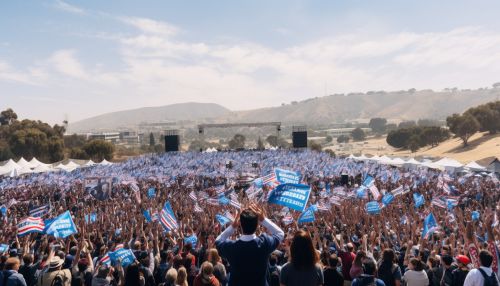Democratic Party (United States)
History
The Democratic Party is one of the two major contemporary political parties in the United States, along with its main rival, the Republican Party. Tracing its heritage back to Thomas Jefferson and James Madison's Democratic-Republican Party, the modern-day Democratic Party was founded around 1828 by supporters of Andrew Jackson, making it the world's oldest active political party.
The Democrats' dominant worldview was once social conservatism and economic liberalism while populism was its leading characteristic in the rural South. In 1912, Theodore Roosevelt ran as a third-party candidate in the Progressive ("Bull Moose") Party, leading many of the party's leaders to join the Democratic Party. Under the leadership of Franklin D. Roosevelt, the party moved leftward and pursued a policy of modern liberalism, with a platform dominated by labor, minorities, and progressive reformers. The party's philosophy of modern liberalism advocates social and economic equality, along with the welfare state. It seeks to provide government intervention and regulation in the economy.


Ideology and Factions
The Democratic Party is generally associated with more progressive policies. It supports social and economic equality, along with the welfare state and environmental protection. The party has a broad range of views but is generally united by a belief in a mixed economy and social justice. The Democratic Party has both liberal and conservative factions.
The party's philosophy of modern liberalism advocates for government intervention in the economy and it supports a broad range of social reforms such as civil rights, LGBTQ+ rights, and women's rights. The party has a mixed record on abortion rights, but most Democrats are rated pro-choice and oppose efforts to overturn Roe v. Wade. Many Democrats support higher minimum wages, universal health care, tuition-free college, and campaign finance reform. The party is split on trade issues, with some members supporting free trade agreements like the North American Free Trade Agreement (NAFTA) and others opposing them.
Structure and Composition
The Democratic Party, like the Republican Party, is organized at the federal, state, and local level. The Democratic National Committee (DNC) is responsible for promoting Democratic campaign activities. While the DNC is responsible for overseeing the process of writing a platform every four years, the DNC is more focused on campaign and organizational strategy than public policy.
At the state and local level, Democratic Party organizations are often responsible for candidate recruitment, primary elections, and other campaign activities. These organizations often work closely with the DNC and other national Democratic organizations.
Electoral History
The Democratic Party has a long and complex electoral history. The party has won 23 of the 59 presidential elections and has been the majority party in the House of Representatives and the Senate for more than half of the time since 1932. The party has also had a significant influence on the Supreme Court, with Democratic presidents appointing a plurality of the justices since 1961.
